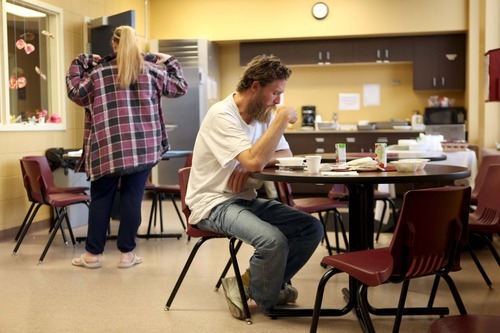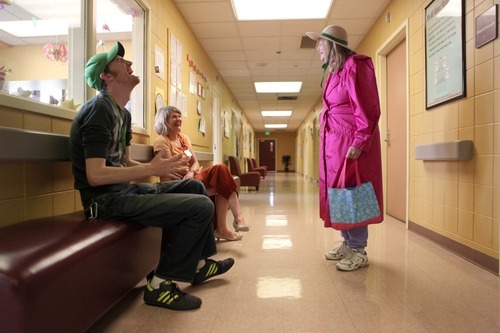This is an archived article that was published on sltrib.com in 2012, and information in the article may be outdated. It is provided only for personal research purposes and may not be reprinted.
A woman is acting strangely at an art gallery so the business owner calls the mental health crisis line. A crisis team is dispatched and determines she may be psychotic.
But instead of taking her to jail or a hospital, the team leads her voluntarily to a "recovery center" — a home-like space with couches, recliners and warm colors, where she will be asked about her needs and strengths, not her illness. She can stay up to a week, working through her crisis and developing a plan to avert or manage future problems.
Once she leaves, a trained peer, someone who is recovering from his or her mental illness, will help her with tasks such as making appointments with therapists and obtaining food stamps or Medicaid coverage.
Such a center is set to open in Salt Lake County in June. Mayor Peter Corroon recently approved awarding up to $6 million to the University of Utah Neuropsychiatric Unit (UNI) to develop the center, along with other features of the county's redesigned crisis response system. The negotiated amount may be closer to $4.5 million.
The plan is designed to avoid unnecessary hospitalizations and jail stays and improve outcomes for patients by emphasizing hope, choice, empowerment and wellness even in times of crisis.
The new center will offer an "opportunity for a client to take a breath, relax in a relaxing environment, in a nonthreatening environment," said Richard Elorreaga, executive director of OptumHealth, which oversees the county's $47 million mental health programs for people on Medicaid.
The for-profit subsidiary of UnitedHealth Group took over from Valley Mental Health last July and was charged with redesigning the crisis system. It has saved about $3.2 million since then, largely because Valley, its main contractor, didn't provide the expected volume of care to patients.
Those savings, along with Medicaid reimbursements and county money for the uninsured, will pay for the care.
Optum is set to receive a $200,000 bonus, under its contract with the county, for building the new crisis response system.
"Our hope is to create an environment across the service continuum for people to discover their strengths within, develop new skills and be supported in making the transition from crisis to wellness," Optum and the county said in the request for proposals for the services.
The new vision has been a boon for UNI. It also recently won a $2.4 million contract for the county's mobile unit crisis teams, which launched in March to respond in person to adults and children with mental health emergencies. UNI beat out Valley for all of the contracts.
UNI also runs the county's mental health crisis hot line, something Valley used to do.
UNI's new contracts make up for the $4 million it and the U.'s psychiatry department lost from fewer patients and reduced fees when Optum took over. But UNI executive director Ross Van Vranken said that wasn't the only reason it sought out the new services.
"We're not trying to be the new Valley Mental Health. We're trying to be involved in the community because we're going to be here forever. As a university, we've always tried to fill gaps."
Valley's CEO Gary Larcenaire said, "We are excited about the expansion of mental health services in the area and welcome the opportunity to continue to partner with the university, Salt Lake County and Optum Health in these endeavors."
The recovery center will be built in a to-be-determined spot away from campus. UNI considered building it at or near its inpatient psychiatric hospital. But linking it to a hospital doesn't send a recovery message.
Elorreaga estimates the $2.8 million, 16-bed recovery center will serve 1,200 to 1,300 people a year. They will be brought by police, by family members, the mobile crisis teams or come on their own. It will be free to people with Medicaid benefits and the uninsured. He said insured patients could also come, though he said most insurance companies likely wouldn't cover the cost.
UNI will also create a home-like "receiving center" at the hospital for patients involuntarily brought by police or others. But the $2.7 million center will feel more like a "living room" with a philosophy of "no force first." Patients there will also be greeted by peers to help them work through the crisis. They could then leave to the community or go to the recovery center. Those who are a threat to themselves or others would be admitted to the hospital.
UNI's new contract also includes $225,000 to create a "warm line" staffed by peers who can take calls from people who aren't in crisis but need a "compassionate" listener. The line will be running by the end of April or early May.
"I'm just really excited to get it in place for the consumers," said Tim Whalen, director of the county's behavioral health system.
A look at Tacoma's recovery center
A Recovery Response Center created by OptumHealth in Tacoma, Wash., is the model for Salt Lake County's new effort. Read about the Tacoma center here. http://bit.ly/oOdsKm





